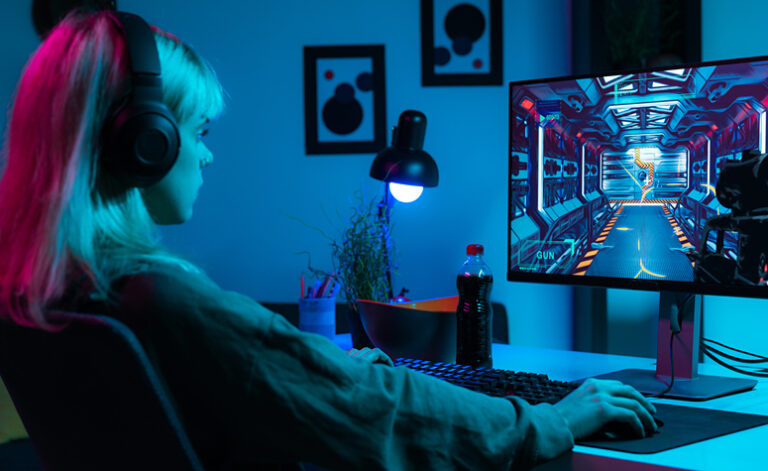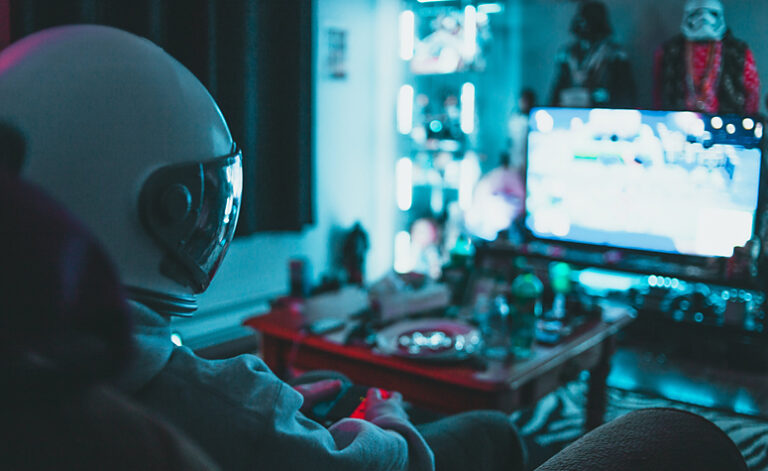Understanding and Treating Gaming Addiction
Classified as a behavioural dependency, this type of addiction presents through recurrent gaming. It is a habit that persists even when it has severe adverse consequences on one’s life and those around you, including problems with interpersonal relationships, personal finances, and work.

What is Gaming Addiction
Based on the nature of the addiction, gaming dependency can be separated into two distinct categories:
- Single-player gaming addiction
Dependency on single-player, narrative-based video games that typically comprise several missions one must complete to reach a certain end goal in order to win - Multiplayer gaming addiction
Addiction to online games that one can enjoy with people from all across the world; their addictive nature comes from the fact that they usually have no conclusion, so players can keep returning to them indefinitely
Gaming Addiction Symptoms

Separating gaming addiction from a mere hobby is essential, and it can be done by observing two key signs:
- An unnatural obsession with computer gaming — if a person is so preoccupied with gaming that they are constantly distracted and
impatient to play again, they are most likely addicted - Gaming as a coping mechanism — those who use gaming as a way
to cope with stress or negative emotions can be seen as dependent
Regardless of its type, gaming addiction can be recognised via numerous social and emotional symptoms. They include the following:
Emotional symptoms of gaming addiction
- Actively thinking about games even when you are not playing them
- Growing apart from family and friends in order to have more free time for gaming
- Experiencing withdrawal symptoms such as irritability and a feeling of strong unease when you are unable to game
- Sudden and extreme mood changes dependent on your ability to play games at the time you wish
Social symptoms of gaming addiction
- Inadequate work performance
- Being dishonest about your gaming habits to loved ones
- Weak academic performance due to gaming
- Avoiding or not caring about hobbies and events that you
have previously enjoyed
Naturally, these key indicators may vary based on the type of gaming dependence a person is combating.
Living With a Child Addicted to Online Gaming
Jamie Austin, whose son has been struggling with an online gaming addiction for several years, recently shared his experience in hopes of helping other parents. His goal is to raise awareness about the gravity of gaming dependency and urge other parents to trust their intuitions and act as quickly as possible if they believe their children need help.
“My son was by nature always somewhat withdrawn and introverted. However, this behaviour only worsened when he became completely immersed in the fantasy worlds of online games. He even started neglecting his hygiene and completely ignoring everyone around him,”
– Austin reveals

When to Get Gaming Addiction Help
For many people, gaming is a hobby they occasionally indulge in, even if they enjoy a particular game so much that they play it for an extended period. However, their avid love of the activity may very well develop into an addiction if:
- They are continuously thinking about the game even while not playing it
- Their mood solely depends on whether they can indulge in the game
- They experience withdrawal symptoms when unable to game for an extended period
- Their tolerance has increased, meaning that they need to play the game more frequently to experience gratification
In case you or someone you hold dear is exhibiting these symptoms, you can receive expert care and addiction treatment at one of our centres.

How is Video Game Addiction Treated?
At our facilities, gaming addiction treatment closely resembles our programmes dedicated to all other dependencies, including alcoholism and drug misuse. Therefore, patients can undergo inpatient, daycare, and outpatient treatment based on their needs.
To ensure patients have all the necessary means for overcoming addiction, our team provides them with different forms of therapy:
- Cognitive behavioural therapy (CBT)
Conversation-based therapy sessions that aim to uncover any underlying factors that might be causing addictive behaviours - Family therapy
A type of therapy that examines one’s home life and upbringing to gauge whether they are the root cause for excessive gaming - Self-help and group therapy
Group therapy sessions that can show patients they are not alone in their struggles, making subsequent recovery more feasible
For patients who are suffering with more severe symptoms, we strongly recommend our 12-step inpatient treatment programme. At our facilities, you will have limited to zero contact with the gaming world, ensuring you can work on developing healthier coping mechanisms moving forward. In addition, your gaming addiction will be treated in conjunction with any additional mental health issues that you might be harbouring, including depression and anxiety.

What lies behind us and what lies before us are
tiny matters compared to what lies within us
What Causes Gaming Addiction?
With technological advancements, the virtual world of games has expanded beyond anyone’s expectations. Nowadays, players can become completely immersed in realistic new dimensions, making it easier for addiction to take root.
Due to this evolution, experts discern between two potential causes for gaming dependency. They include:
- Brain chemistry changes
- Emotional changes
Changes in brain chemistry
Similarly to the majority of substance and behavioural dependencies, this type of addiction may develop due to the dopamine surge gaming causes in players. Often referred to as the happy hormone, dopamine enters the brain whenever you experience a pleasurable sensation.
Once released, dopamine impacts the reward system in your brain. Additionally, it affects your mood, memory, and problem-solving skills. If you particularly enjoy gaming, every session will be followed by a dopamine increase, ensuring you feel lighter and happier.
With time, your brain may begin associating gaming with these positive sensations. As a result, you will crave this activity more frequently, transforming it into a compulsive habit. Without professional assistance, breaking out of this cycle is extremely challenging.
Emotional changes
In many cases, gaming addiction coexists with substance abuse or other underlying mental health problems such as anxiety or depression. This has led numerous researchers to believe that a patient’s emotions have an essential role in the development of this type of dependency.
Namely, many patients utilise gaming to cope with numbness, sadness, fear, low self-esteem, and other negative sensations. For one, the quest-style design of games provides patients with a sense of purpose. Similarly, solving missions helps them feel accomplished, which they may not experience that often outside of gaming.
However, none of these sensations are long-lasting. They are quick to fade, leaving behind a strong feeling of numbness. In order to eliminate it, patients start gaming more frequently, all in the hope of escaping their overwhelming reality.
Gaming Addiction Support
Regardless of how severe your gaming addiction might be, you do not have to combat it alone. At our facilities, help is readily available to anyone who seeks it. Inquire about our addiction programmes today, and we will provide you with a customised treatment plan that will help you manage and overcome your dependency.
FREE Addiction Assessment
If your or a loved one are struggling with addiction, we understand the challenges you’re facing and we’re here to offer compassionate help.
Our highly trained advisers are available to speak to you right away, simply call 0808 252 3379 today.
We can discuss your concerns in complete confidence, explore the options for treatment, and help you to understand what will work best for you.
We’ll also help you to book your free addiction assessment there and then, with appointments usually available within only a few days.
We understand that taking the first step can be the most difficult, but we’re here to support – with no pressure or judgement.
Professional and compassionate help is just a phone call or click away.




